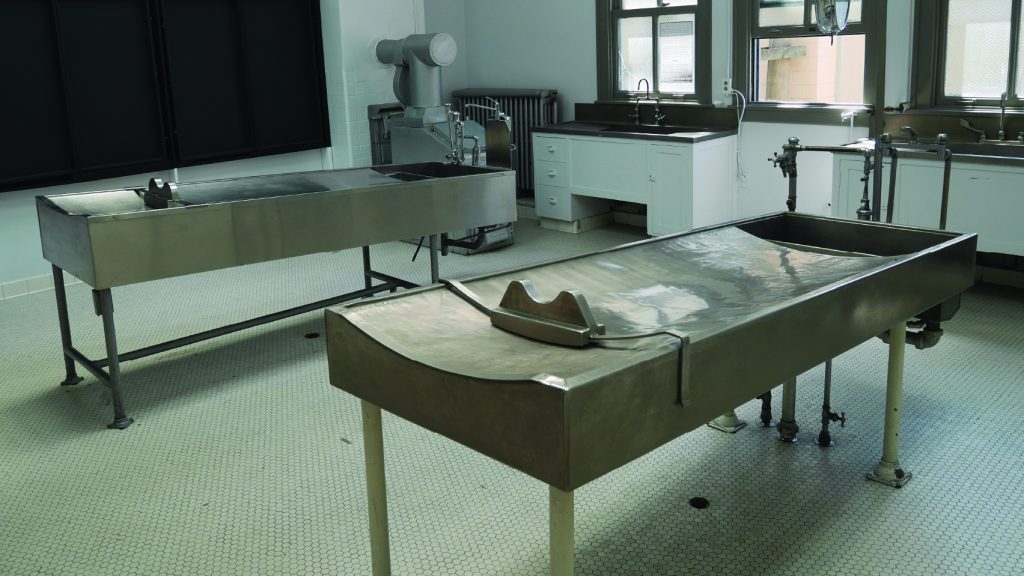
Funeral home operations include a variety of different things. They generally handle customer service, funerary arrangements, and, of course, body preparation. While the former two services may result in some amount of standard garbage, or municipal waste, the latter results in a more potentially dangerous, medical type of waste. In order to maintain compliance with local, state, and federal waste regulations, it is important for funeral homes to manage their waste in the safest, most efficient way.
Types of Funeral Home Medical Waste
Among the most common funeral home practices is body preparation for burial or cremation. If the family of the deceased wishes for them to be buried, a mortician will most likely embalm the body to preserve it for showing at the funeral. The preparation process involves the cleaning and embalming of the body. The embalming process involves the draining of blood from the body and replacing it with embalming fluid, which is pumped through the arteries of the deceased. Blood and other bodily fluids removed from the body are considered pathological waste. The cloths or materials used in the cleaning process should also be properly disposed of to prevent the spread of diseases and bacteria.
In addition to embalming, some bodies may require autopsies if the deceased did not pass in a hospital and a cause of death needs to be identified, or if they were involved with or connected to a criminal case. Since an autopsy is a surgical procedure that involves the dissection of a body, the use of tools, such as scalpels, needles, or syringes, may be employed. These tools are usually discarded after use and must be handled with care, due to the dangers posed by sharps waste. Other miscellaneous objects and tools used to prepare a body, such as cosmetics, adhesives, tissue builders, etc., should also be carefully disposed of to prevent the possible spread of diseases.
Human bodies often come to funeral homes in a variety of different states or stages of decay. As a result, they may carry disease or bacteria that may be harmful should they come into contact with people or the environment. For this reason, funeral home employees must be thoroughly trained in funeral waste management in order to protect themselves during their handling of dead bodies. Deceased may also still contain medication or other pharmaceuticals in their system, as well as traces of chemotherapy agents, which need to be disposed of safely to avoid environmental contamination. This type of waste is considered biohazardous waste and must be especially paid close attention to.

How to Dispose of Funeral Home Medical Waste
Funeral home medical waste disposal involves the separation of waste into separate categories based on their method of disposal. Since the state of Texas allows for medical waste treatment to occur either on-site or off-site, larger facilities, such as hospitals, may be equipped with the knowledge and equipment needed for the proper disposal of medical waste. In order to safely dispose of pathological waste, for example, the discarded waste must be securely stored in bags marked with hazardous waste labels then subjected to autoclaving and incineration.
Sharps waste must be stored in puncture-proof, leak-proof containers that will remain securely sealed throughout the disposal process. FDA-approved sharps containers are usually available at most pharmacies and by medical providers. Disposal of sharps after use requires careful handling and the use of personal protective equipment (PPE) in order to prevent any bodily harm or injury is important.
Biohazardous waste often requires careful attention when it comes to disposal. This type of waste has the potential to spread disease and bacteria to humans and animals or contaminate the surrounding environment. Due to its highly dangerous nature, biohazardous waste and its disposal is closely monitored in most states. It is most commonly disposed of through incineration with 90% of biohazardous waste being incinerated, according to the EPA.
While the responsibility of proper waste handling falls to the practicing facility, the safest, most secure way to ensure that any waste generation is disposed of properly and within OSHA compliance is through a medical waste disposal company.
Funeral Home Waste Disposal Solutions
MedCycle is a full-service biohazard waste company based in Houston, Dallas, Austin, and San Antonio that provides safe and cost-effective management of regulated biomedical waste. We are committed to providing excellent customer service and doing everything possible to meet our clients’ needs. Our comprehensive waste management offers same-day removal or regularly-scheduled medical waste collections, and instant online access to your electronic medical waste records. Besides the disposal of pathological, sharps, and other hazardous waste, we also offer the shredding of medical records for space-saving, privacy, and security purposes.
MedCycle not only provides waste management services to funeral homes, but also to small- and large-scale healthcare facilities, medical-related practices, and tattoo parlors. We also provide online training to ensure your business’s compliance with OSHA requirements. Partnered with the leading training provider in the industry, our online compliance portal is a trusted resource for thousands of businesses for compliance information, tools, and training. Focus more on your practice and less on the trash by letting us handle your waste disposal for you. Contact us today and get a free quote for your funeral home or business today.
